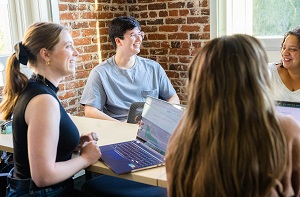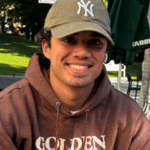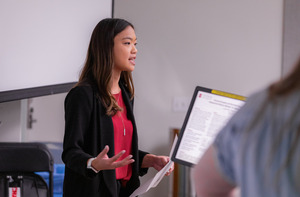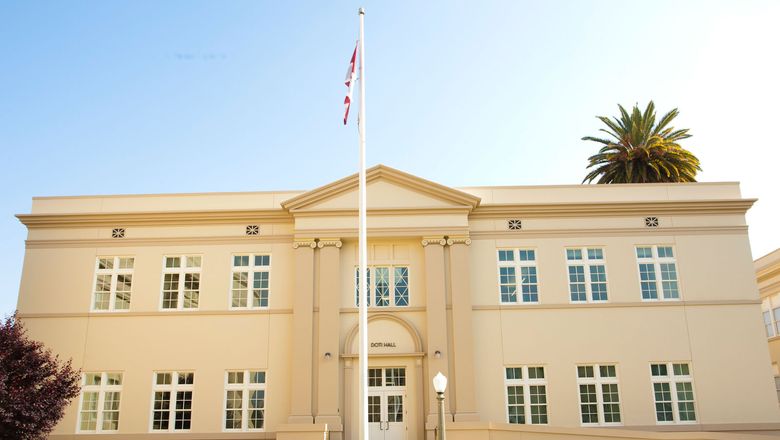As an undergraduate student in Chapman’s School of Communication, you’re required to participate in an internship or an independent study.
We encourage you to follow your interests as a communicator and choose the option that most resonates with you. A School of Communication advisor can help you explore your options. Read on to learn more about internships and independent study.- School of Communication
- About the School of Communication
- Undergraduate Programs
- Graduate Programs
- Undergraduate Advising
- Student Groups & Organizations
- Internships and Independent Study
- Presidential Studies Program
- Center for Demographics and Policy
- Careers and Connections
- Faculty Directory
- Contact Us
- Support the School of Communication
- Center for Strategic Communication Initiatives
- School of Communication Faculty Directory
- Follow
»Internships and Independent Study

Internships
Internships are a great way to build professional experience while in school — so great that around 80% of Chapman students participate in one.
For School of Communication students, internships are the best way to:
- Explore an industry you’re interested in.
- Begin networking with professionals in communication roles.
- Learn how the skills you are building in your communication classes apply to the professional world.
- Gain real work experience that you can add to your resume.
Where have previous School of Communication students interned?
A degree from the School of Communication qualifies you to work in almost any industry you can imagine. We encourage you to follow your interests and work with our faculty, advisors, and the Career and Professional Development Center to explore your options.
Scroll through the slides below to see some of the internships previous Communication students have done, or check out more on our School of Communication blog.




Independent study
An independent study gives you the opportunity to engage in academic research. You can research on your own, or alongside your professors.
If you find academic research engaging and want to gain experience in it, independent study is the option for you.
Independent study offers the opportunity for you to:
- Conduct research on the communication topics that interest you.
- Work one-on-one with a professor to build your skills, and
- Build skills that you can use in the academic world and in your future career.
- Add academic research to your resume, a must-have if you are considering graduate programs or professional school.
- Participate in academic conferences and potentially have your work published in academic journals.
Building practical skills through independent study
While internships are mostly about building work experience, independent study revolves around academics and research. If you plan to enter a career in academia or pursue post-graduate education, independent study is a great way to get started on that track and gain the necessary skills.
Depending on the independent study, you may:
- Gain administrative experience operating labs or organizing events.
- Design websites.
- Design educational materials.
- Learn how to conduct interviews, focus groups and surveys.
- Learn how to analyze various types of data, including analysis of open-ended questions, statistical analysis of survey results, analysis of physiological data, facial expressions, and more.
- Work on writing and presentation skills for various target audiences and purposes (e.g., writing scripts, storyboards, educational materials, research reports, etc.)
Finding an independent study
Ready to get started on your independent study? Here are a few ways to take the first step.
- Talk to your instructors. If there is a class you’re especially interested in, you may be able to conduct research related to it. The instructor of the class can help you get started.
- Check out our faculty profiles. If there is a faculty member whose research you find particularly intriguing, reach out to them and ask about participating. They’re happy to help and will be able to speak with you in more detail.
- Schedule an appointment with a School of Communication advisor. An advisor can help you narrow down what you’re looking for in an independent study and connect you with the right resources.
Independent study examples
In the field of communication, research topics are diverse. Here are some examples of past independent studies completed by our students, plus a few links to academic journals where students have published their work.
- A group of students worked on various aspects of a research project considering media users’ romantic interest in and attachment to media figures (e.g., celebrity crushes). Students conducted and transcribed interviews and analyzed fanfiction to advance the understanding of these experiences.
- Students conducted a national survey examining the psychological characteristics of media users that increase their support for diversity initiatives/efforts in the media industry. Students took part in all the steps of the project development, including designing the survey, data analysis, and writing up the study results.
- Students examined how choice of photographs that accompany a news story about police use of lethal force can impact media consumers’ perceptions of the incident. The students took part in all stages of developing materials for an experiment. Data from a national sample demonstrated that such journalistic choices have major implications for media consumers understanding of the story and support for related social policies.
- Students conducted research on how social media influencers can be leveraged in persuasive health messaging.
- Students participated in research regarding communication that family caregivers wish they had received before beginning their caregiving duties to prepare them for the role.
Our School of Communication advising team is here to help you with any questions or concerns you have. Schedule an appointment with an advisor on our Undergraduate Advising page.
- School of Communication
- About the School of Communication
- Undergraduate Programs
- Graduate Programs
- Undergraduate Advising
- Student Groups & Organizations
- Internships and Independent Study
- Presidential Studies Program
- Center for Demographics and Policy
- Careers and Connections
- Faculty Directory
- Contact Us
- Support the School of Communication
- Center for Strategic Communication Initiatives
- School of Communication Faculty Directory
